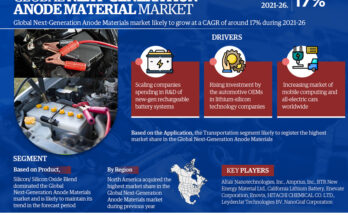According to the TechSci Research report, “Green Carbon Fiber Market – Global Industry Size, Share, Trends, Competition Forecast & Opportunities, 2028”, the Global Green Carbon Fiber Market has valued at USD 145.65 million in 2022 and is anticipated to project robust growth in the forecast period with a CAGR of 4.56% through 2028. The Global Green Carbon Fiber Market is witnessing a profound transformation, and at its heart lies the driving force of technological advancement. As the world grapples with the pressing need for sustainable materials and eco-conscious manufacturing processes, green carbon fiber has emerged as a beacon of innovation, with technology serving as its cornerstone. One of the most prominent drivers of demand for green carbon fiber is its crucial role in addressing environmental concerns.
Technological advancements have paved the way for the development of bio-based precursors for carbon fiber production, derived from renewable sources such as lignin, cellulose, or bio-based polymers. These breakthroughs have not only reduced the carbon footprint associated with carbon fiber manufacturing but have also enhanced the material’s overall sustainability.
The ability to harness biomass as a precursor material is a testament to the potential of technology in mitigating the environmental impact of industrial processes. Moreover, as industries worldwide grapple with increasingly stringent regulations and targets for reducing emissions and enhancing sustainability, green carbon fiber is seen as a pivotal solution. Advancements in manufacturing techniques, including the optimization of production processes and the use of recycled and sustainable feedstocks, have made green carbon fiber a more attractive option.
Industries such as automotive, aerospace, wind energy, and construction are adopting green carbon fiber to align with eco-friendly initiatives and meet regulatory requirements. This alignment is driven by technological innovations that have made green carbon fiber a cost-effective and environmentally responsible choice for these sectors.
In the realm of renewable energy, technological advancements have ushered in a revolution. Wind energy, in particular, relies heavily on lightweight and durable materials, making green carbon fiber an ideal candidate for the construction of wind turbine blades. The development of longer and more efficient turbine blades, facilitated by green carbon fiber, has increased the energy output and efficiency of wind farms. As the demand for renewable energy continues to rise globally, so does the demand for green carbon fiber, making technology a key driver of its growth.
Furthermore, the automotive industry, spurred by the advancement of electric and hybrid vehicles, is turning to green carbon fiber to reduce vehicle weight and enhance fuel efficiency. Advanced manufacturing processes have enabled the integration of green carbon fiber composites into vehicle components, leading to lighter and more environmentally friendly automobiles. Technological innovations in recycling and sustainable sourcing of carbon fiber feedstocks are integral to the automotive sector’s adoption of green carbon fiber materials.
The construction industry, too, is witnessing a shift toward sustainability, driven by technological advancements in material science. Green carbon fiber-reinforced concrete and structural components are being employed to create more resilient and eco-friendly buildings and infrastructure. The combination of green carbon fiber’s high strength and durability with innovative construction techniques is revolutionizing the way buildings are designed and constructed.
In conclusion, technological advancement serves as the linchpin driving the demand for the Global Green Carbon Fiber Market. As industries across the spectrum recognize the imperative of sustainability and eco-conscious manufacturing, green carbon fiber has emerged as a transformative material, poised to redefine the future of numerous sectors. With continuous advancements in production methods, feedstock sourcing, and application development, green carbon fiber is positioned as a sustainable solution that will continue to gain prominence on the global stage. Technology not only facilitates the growth of the green carbon fiber market but also propels industries toward a more sustainable and environmentally responsible future.
Browse over XX market data Figures spread through XX Pages and an in-depth TOC on “Global Green Carbon Fiber Market.” @ https://www.techsciresearch.com/report/green-carbon-fiber-market/19756.html
The Global Green Carbon Fiber Market is segmented into type, source, application, regional distribution, and company. Based on the type, the milled green carbon fiber segment emerged as the largest contributor to the market share during the forecast period. Milled green carbon fiber is often produced from recycled or renewable sources, such as reclaimed carbon fiber composites or plant-based materials. This aligns with growing consumer and industry demands for sustainable and environmentally friendly products, making it an attractive choice for various applications.
Carbon fiber, in general, is known for its lightweight and high-strength properties. Milled green carbon fiber retains these characteristics, making it suitable for a wide range of applications, including automotive, aerospace, sports equipment, and construction. These industries value materials that can reduce weight while maintaining strength and performance.
Governments and regulatory bodies in many regions are increasingly promoting the use of sustainable materials and reducing carbon footprints. This support can boost the adoption of green carbon fibers, including milled varieties, in various industries. Milled green carbon fiber can be tailored to meet specific requirements for different applications. Its versatility allows it to replace conventional materials in various industries, offering potential cost savings and performance improvements.
The North America region has emerged as the dominant player in the Green Carbon Fiber Market in the forecasted period. North America has a robust automotive industry with a significant focus on sustainability, lightweighting, and reducing carbon emissions. The region’s automotive manufacturers have been early adopters of green carbon fiber materials to meet stringent fuel efficiency and emissions standards. This application of green carbon fiber in automotive components, such as body panels and interior parts, contributes to market growth. North America is also home to a substantial aerospace and defense sector, which demands lightweight materials with high strength and durability. Green carbon fiber composites are used in aircraft components, military equipment, and space applications, further boosting the market.
North American consumers and businesses are increasingly focused on sustainability and environmental responsibility. As a result, there is a growing demand for eco-friendly products, including those made with green carbon fiber. Green carbon fiber materials have applications in the renewable energy sector, such as wind turbine blades and solar panels. North America has seen significant growth in renewable energy installations, creating a demand for these materials.
Major companies operating in the Global Green Carbon Fiber Market are:
- Procotex Corp SA
- Vartega Inc.
- Sigmatex (UK) Ltd
- Shocker Composites LLC
- Carbon Conversions Co
- SGL Carbon SE
- Toray Industries Inc
- Gen 2 Carbon Ltd
- Catack-H Co Ltd
- Innovative Recycling SA
To Download FREE Sample Pages of this Report📥 @ https://www.techsciresearch.com/sample-report.aspx?cid=19756
Customers can also request for 10% free customization on this report.
“The Global Green Carbon Fiber Market is experiencing substantial growth due to the increasing demand for sustainable and eco-friendly materials across various industries. Green carbon fiber, produced using renewable resources and processes with a reduced carbon footprint, has gained prominence as a viable alternative to traditional carbon fiber.
Key factors driving this market’s growth include a growing emphasis on environmental sustainability, stringent regulations related to emissions and material sourcing, and a shift toward green and renewable technologies. Industries such as automotive, aerospace, wind energy, and construction are increasingly incorporating green carbon fiber into their products and processes to reduce environmental impact.
Furthermore, advancements in manufacturing techniques and the development of bio-based precursors have enhanced the feasibility and affordability of green carbon fiber, making it an attractive option for industries seeking to align with sustainability goals. As the world continues to prioritize eco-conscious solutions, the Global Green Carbon Fiber Market is expected to thrive as a pivotal component in the transition toward greener and more sustainable material alternatives,” said Mr. Karan Chechi, Research Director with TechSci Research, a research-based management consulting firm.
“Green Carbon Fiber Market- Global Industry Size, Share, Trends, Opportunity, and Forecast, 2018-2028 Segmented by Type (Chopped Recycled Carbon Fiber, and Milled Recycled Carbon Fiber), By Source (Automotive Scrap, Aerospace Scrap, and Others), By Application (Aerospace, Automotive, Wind Energy, Sporting Goods, and Others), By Region and competition”, has evaluated the future growth potential of Global Green Carbon Fiber Market and provides statistics & information on market size, structure and future market growth. The report intends to provide cutting-edge market intelligence and help decision-makers take sound investment decisions. Besides, the report also identifies and analyzes the emerging trends along with essential drivers, challenges, and opportunities in the Global Green Carbon Fiber Market.
You may also read:
India Autoclaved Aerated Concrete Blocks Market Analysis, Development [2029], Key Terms
UAE Decorative Paints Market | [2029] Exploring Market Growth, Potential, Trends
Insulation Products Market Value, Trends [2028], Economy, Expansion, Leader
Table of Content-Green Carbon Fiber Market
- Product Overview
1.1. Market Definition
1.2. Scope of the Market
1.2.1. Markets Covered
1.2.2. Years Considered for Study
1.2.3. Key Market Segmentations
- Research Methodology
2.1. Objective of the Study
2.2. Baseline Methodology
2.3. Key Industry Partners
2.4. Major Association and Secondary Applications
2.5. Forecasting Methodology
2.6. Data Triangulation & Validation
2.7. Assumptions and Limitations
- Executive Summary
3.1. Overview of the Market
3.2. Overview of Key Market Segmentations
3.3. Overview of Key Market Players
3.4. Overview of Key Regions/Countries
3.5. Overview of Market Drivers, Challenges, Trends
- Impact of COVID-19 on Global Green Carbon Fiber Market
- Voice of Customer
- Global Green Carbon Fiber Market Outlook
6.1. Market Size & Forecast
6.1.1. By Value & Volume
6.2. Market Share & Forecast
6.2.1. By Type (Chopped Recycled Carbon Fiber, and Milled Recycled Carbon Fiber)
6.2.2. By Source (Automotive Scrap, Aerospace Scrap, and Others)
6.2.3. By Application (Aerospace, Automotive, Wind Energy, Sporting Goods, and Others)
6.2.4. By Region
6.2.5. By Company (2022)
6.3. Market Map



